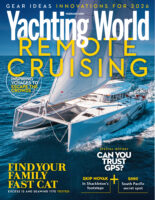Feeling battered, Golding takes a reef and a rest which costs him miles in the Vendée Globe
Mike Golding is going through some of the most frightening sailing conditions of his career. As Ecover charges along towards the waypoint to the south of Australia, the war-weary skipper is reluctant to leave the safety of his bunk for fear of sustaining more knocks and bruises. The violent motion of the boat is making it extremely dangerous to move around.
And yet still he frets about a loss of miles to his close rival, Sébastien Josse on VMI. “I didn’t have a good day yesterday, really. I think I’ve lost 30 miles from where I should be. Call it what you like, maybe I copped out, but I’m a bit bruised. It was blowing hard, about 45 knots, in hard reaching conditions, so I took a deep reef.”
Golding said he reduced the mainsail to its third reef partly through fear and partly through fatigue. “I was getting tired and it was just uncontrollable. We had a surf rolling in from behind. You’ll be going along at 16-18 knots and then you’ll get picked up and suddenly you’re doing speeds of 24, 26, sometimes 28 knots. It’s a whole different game from running, doing this reaching, because the loads go up exponentially. All in all, it was a bit scary. I was convinced something was going to get broken. So I put in a reef, grabbed some sleep, and I when I woke up and it was time to shake the reef out again, I was 30 miles down.”
It is one of the perennial challenges for a Vendée skipper, treading the fine line between ultimate performance and ultimate catastrophe. Golding is pushing the margin but he still berates himself for perhaps not pushing harder.
“It was the right thing to do at the time, but I’m just bitter about the loss. It’s cost me quite dearly, it’s annoying. It’s a perfect illustration that if you have one reef wrong – and I’m not talking about the sail plan being massively wrong – for three hours, then you can lose 30 miles, which is just extraordinary. It’s not just the speed, it’s not like we’re doing 10 miles an hours slower, it’s putting in the reef, shaking out the reef. I just think I lost my bottle for a while.”
Golding said the wind was still “howling out there”, but now he’s decided to just keep the sails up and turn up the stereo to drown out the horrific noises of an overstressed and overfast boat.
The force of the water driving past the boat is immense. Small wonder that Golding prefers to stay below unless absolutely necessary. “It’s just outrageously wet, there’s a huge amount of water coming across the boat. Just wave action alone broke the one-and-a-quarter inch carbon support for the antenna, so I’ve been out fixing that this morning.”
Golding says he has almost “acclimatised” to the conditions, but he doesn’t like it one bit. “This is harsh sailing, harsh on the boat, harsh on the driver, and you’re just waiting to see what’s going to break.” But as he points out: “There’s a golden rule down here in the Southern Ocean: Someone’s always having a more sh*t day than you.” This misfortunes of people like Joe Seeten with his second broken rudder and Jean-Pierre Dick with his second broken gooseneck.
By comparison, the British boat has been let off lightly, and Golding continues to praise Ecover’s sturdy performance. “The boat’s doing stunningly well. The little antenna breaking off the back is a real annoyance to me because it’s an annoying breach of an otherwise perfect boat.”
The other irriation is that he and the other leading boats have been forced on to a reaching course to sail up to the compulsory waypoint on the Vendee route. It is making life tougher than it might otherwise have been. “This Australian waypoint was the one waypoint on the course that was controversial. We’re being forced up to it when the reality is we could be on a course that is shorter, much freer and much faster and safer. If there’s damage in these 24 hours and it causes a problem for a boat, then the Australians have only got themselves to blame.”
Once Golding has reached the waypoint, he can turn Ecover back on to a more southerly course again with the wind behind. And then maybe, both skipper and boat can breathe a sigh of relief after this stressful period in the race.



